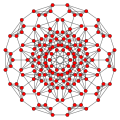 5-cube |
 Truncated 5-cube |
 Bitruncated 5-cube | |
 5-orthoplex |
 Truncated 5-orthoplex |
 Bitruncated 5-orthoplex | |
| Orthogonal projections in B5 Coxeter plane | |||
|---|---|---|---|
In five-dimensional geometry, a truncated 5-cube is a convex uniform 5-polytope, being a truncation of the regular 5-cube.
There are four unique truncations of the 5-cube. Vertices of the truncated 5-cube are located as pairs on the edge of the 5-cube. Vertices of the bitruncated 5-cube are located on the square faces of the 5-cube. The third and fourth truncations are more easily constructed as second and first truncations of the 5-orthoplex.
Truncated 5-cube
edit| Truncated 5-cube | ||
|---|---|---|
| Type | uniform 5-polytope | |
| Schläfli symbol | t{4,3,3,3} | |
| Coxeter-Dynkin diagram | ||
| 4-faces | 42 | 10 32 |
| Cells | 200 | 40 160 |
| Faces | 400 | 80 320 |
| Edges | 400 | 80 320 |
| Vertices | 160 | |
| Vertex figure | ( )v{3,3} | |
| Coxeter group | B5, [3,3,3,4], order 3840 | |
| Properties | convex | |
Alternate names
edit- Truncated penteract (Acronym: tan) (Jonathan Bowers)
Construction and coordinates
editThe truncated 5-cube may be constructed by truncating the vertices of the 5-cube at of the edge length. A regular 5-cell is formed at each truncated vertex.
The Cartesian coordinates of the vertices of a truncated 5-cube having edge length 2 are all permutations of:
Images
editThe truncated 5-cube is constructed by a truncation applied to the 5-cube. All edges are shortened, and two new vertices are added on each original edge.
| Coxeter plane | B5 | B4 / D5 | B3 / D4 / A2 |
|---|---|---|---|
| Graph | |||
| Dihedral symmetry | [10] | [8] | [6] |
| Coxeter plane | B2 | A3 | |
| Graph | |||
| Dihedral symmetry | [4] | [4] |
Related polytopes
editThe truncated 5-cube, is fourth in a sequence of truncated hypercubes:
| Image | ... | |||||||
|---|---|---|---|---|---|---|---|---|
| Name | Octagon | Truncated cube | Truncated tesseract | Truncated 5-cube | Truncated 6-cube | Truncated 7-cube | Truncated 8-cube | |
| Coxeter diagram | ||||||||
| Vertex figure | ( )v( ) | ( )v{ } |
( )v{3} |
( )v{3,3} |
( )v{3,3,3} | ( )v{3,3,3,3} | ( )v{3,3,3,3,3} |
Bitruncated 5-cube
edit| Bitruncated 5-cube | ||
|---|---|---|
| Type | uniform 5-polytope | |
| Schläfli symbol | 2t{4,3,3,3} | |
| Coxeter-Dynkin diagrams | | |
| 4-faces | 42 | 10 32 |
| Cells | 280 | 40 160 80 |
| Faces | 720 | 80 320 320 |
| Edges | 800 | 320 480 |
| Vertices | 320 | |
| Vertex figure | { }v{3} | |
| Coxeter groups | B5, [3,3,3,4], order 3840 | |
| Properties | convex | |
Alternate names
edit- Bitruncated penteract (Acronym: bittin) (Jonathan Bowers)
Construction and coordinates
editThe bitruncated 5-cube may be constructed by bitruncating the vertices of the 5-cube at of the edge length.
The Cartesian coordinates of the vertices of a bitruncated 5-cube having edge length 2 are all permutations of:
Images
edit| Coxeter plane | B5 | B4 / D5 | B3 / D4 / A2 |
|---|---|---|---|
| Graph | |||
| Dihedral symmetry | [10] | [8] | [6] |
| Coxeter plane | B2 | A3 | |
| Graph | |||
| Dihedral symmetry | [4] | [4] |
Related polytopes
editThe bitruncated 5-cube is third in a sequence of bitruncated hypercubes:
| Image | ... | ||||||
|---|---|---|---|---|---|---|---|
| Name | Bitruncated cube | Bitruncated tesseract | Bitruncated 5-cube | Bitruncated 6-cube | Bitruncated 7-cube | Bitruncated 8-cube | |
| Coxeter | |||||||
| Vertex figure | ( )v{ } |
{ }v{ } |
{ }v{3} |
{ }v{3,3} |
{ }v{3,3,3} | { }v{3,3,3,3} |
Related polytopes
editThis polytope is one of 31 uniform 5-polytope generated from the regular 5-cube or 5-orthoplex.
Notes
editReferences
edit- H.S.M. Coxeter:
- H.S.M. Coxeter, Regular Polytopes, 3rd Edition, Dover New York, 1973
- Kaleidoscopes: Selected Writings of H.S.M. Coxeter, edited by F. Arthur Sherk, Peter McMullen, Anthony C. Thompson, Asia Ivic Weiss, Wiley-Interscience Publication, 1995, ISBN 978-0-471-01003-6 [1]
- (Paper 22) H.S.M. Coxeter, Regular and Semi Regular Polytopes I, [Math. Zeit. 46 (1940) 380-407, MR 2,10]
- (Paper 23) H.S.M. Coxeter, Regular and Semi-Regular Polytopes II, [Math. Zeit. 188 (1985) 559-591]
- (Paper 24) H.S.M. Coxeter, Regular and Semi-Regular Polytopes III, [Math. Zeit. 200 (1988) 3-45]
- Norman Johnson Uniform Polytopes, Manuscript (1991)
- N.W. Johnson: The Theory of Uniform Polytopes and Honeycombs, Ph.D.
- Klitzing, Richard. "5D uniform polytopes (polytera)". o3o3o3x4x - tan, o3o3x3x4o - bittin